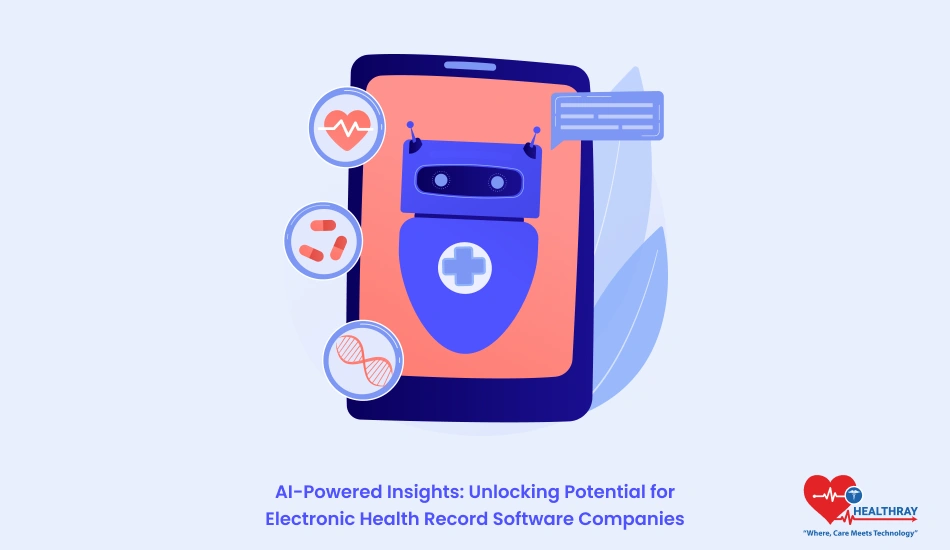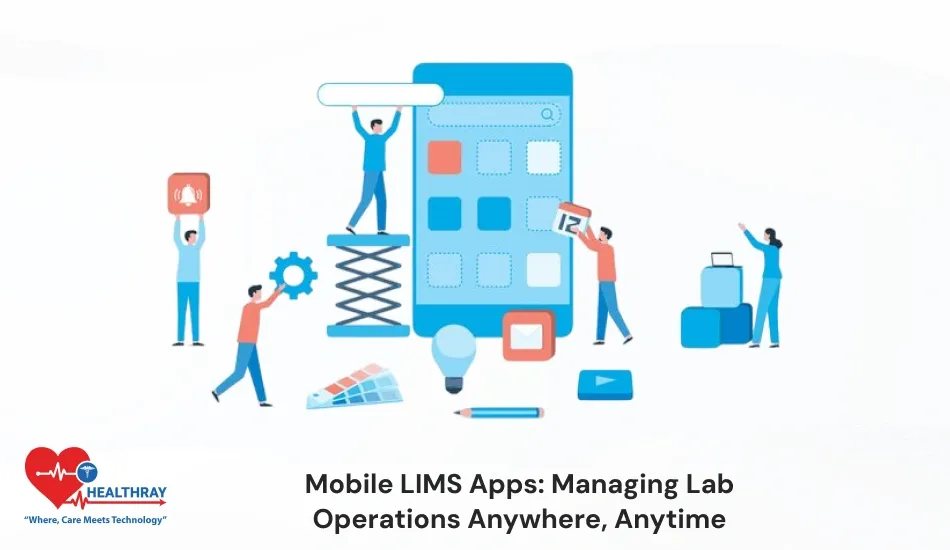Why are EHR companies diving into AI? It’s simple. The healthcare industry demands smarter, faster, and more accurate tools, and AI offers just that. Electronic Health Record (EHR) systems, once known for digitizing patient data, now have the potential to evolve into powerful tools that do more than store information. AI is making it possible to predict trends, enhance clinical decisions, and automate time-consuming tasks.
This post explores how EHR companies can use AI-powered insights to revolutionize their systems. From improving patient outcomes to streamlining operations, there’s a lot to gain. We’ll also cover practical steps for implementing AI, tackling challenges like privacy concerns, and where the future of AI in EHR Software is headed.
Benefits of AI Integration in EHR Systems
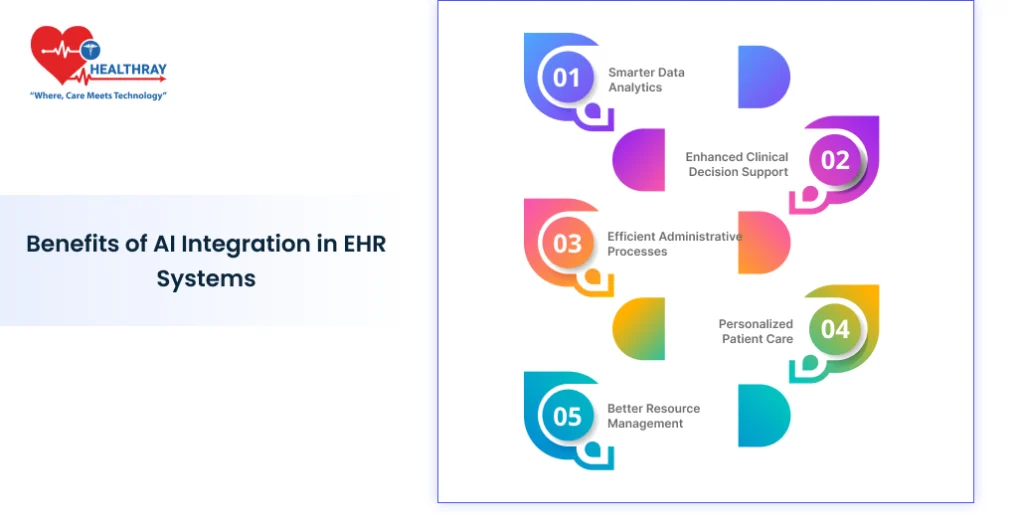
AI isn’t just a buzzword for EHR companies. It’s becoming a key player in addressing long-standing challenges. Here’s how it’s reshaping EHR systems:
Smarter Data Analytics
AI helps uncover patterns in vast amounts of patient data, offering insights that were impossible to see before. For example, predictive analytics can identify patients at risk of developing chronic conditions early, allowing for timely intervention.
Enhanced Clinical Decision Support
AI-powered systems assist healthcare providers by suggesting treatment plans based on a patient’s history, lab results, and even genetic data. This not only saves time but also reduces the chances of errors.
Efficient Administrative Processes
Documentation and scheduling are huge pain points in healthcare. AI automates repetitive tasks like coding for billing or managing appointment reminders, freeing up time for medical staff to focus on patient care.
Personalized Patient Care
By analyzing individual patient data, AI can suggest tailored treatment plans. This leads to better patient outcomes and higher satisfaction levels.
Better Resource Management
AI can optimize the use of resources, such as predicting peak times in hospitals and helping allocate staff or equipment accordingly.
Each of these benefits directly impacts the core objectives of EHR companies: improving patient outcomes, driving operational efficiency, and staying competitive in a crowded market.
Implementation Strategies for AI in EHR Systems
Integrating AI into EHR systems isn’t just about adding new features. It requires a strategic approach to ensure it aligns with organizational goals and delivers real value. Here’s how EHR companies can effectively adopt AI:
Assess Current Systems and Identify Gaps
Start by evaluating your existing EHR platform. What are its strengths? Where does it struggle? Whether it’s data analysis, clinical decision support, or user interface challenges, identifying these gaps will guide AI integration efforts.
Set Clear Objectives
Define what you want AI to achieve. Is it better data utilization? Improved patient care? Faster administrative processes? Clear goals help prioritize AI features and ensure alignment with organizational needs.
Choose the Right AI Tools
Not all AI tools are created equal. Look for solutions designed for healthcare, ensuring they comply with industry regulations and support interoperability with other systems.
Pilot Programs for Proof of Concept
Before full-scale implementation, test AI tools in a controlled environment. A pilot program helps identify potential issues and fine-tune the system for broader use.
Collaborate with Clinicians
Engage doctors, nurses, and administrators early in the process. Their input ensures that the AI tools address real-world challenges and fit seamlessly into workflows.
Ensure Robust Data Security
With AI handling sensitive patient data, robust encryption, access controls, and compliance with regulations like HIPAA are non-negotiable.
Train and Support Users
AI adoption requires a shift in how teams operate. Provide training sessions to help staff understand and trust the technology, ensuring a smoother transition.
Measure Success and Iterate
Track key performance indicators like patient outcomes, operational efficiency, and user satisfaction. Use these insights to refine the AI system over time.
This strategic approach not only minimizes risks but also maximizes the chances of a successful AI integration, helping Electronic Health Records Systems companies unlock the full potential of their platforms.
Addressing Challenges in AI Integration for EHR Systems
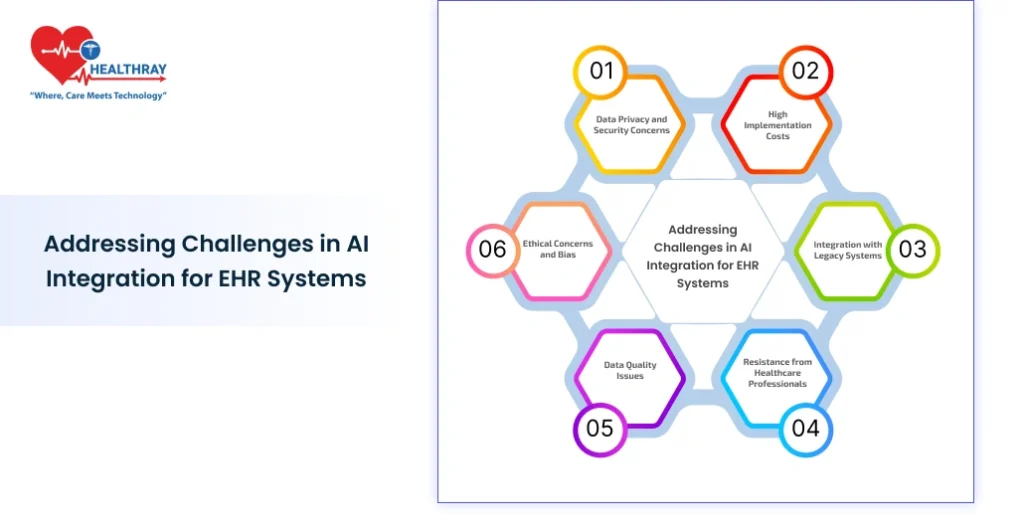
Adopting AI in EHR systems offers immense potential, but it also comes with its own set of challenges. Overcoming these obstacles is crucial for ensuring a smooth integration and sustainable success. Let’s tackle some of the key hurdles and strategies to address them:
Data Privacy and Security Concerns
With patient data at the core of EHR systems, ensuring its security is critical. AI tools rely on large datasets, making them potential targets for cyberattacks.
- Solution: Implement robust encryption protocols, access controls, and real-time monitoring. Compliance with healthcare regulations like HIPAA and GDPR is non-negotiable. Partner with vendors who prioritize data security.
High Implementation Costs
AI technology requires significant investment in tools, infrastructure, and training. This cost can deter smaller EHR companies from adopting AI.
- Solution: Start with small-scale pilot programs to demonstrate ROI before scaling up. Look for modular AI solutions that allow incremental implementation to manage costs effectively.
Integration with Legacy Systems
Many EHR platforms rely on outdated technology that struggles to support modern AI tools.
- Solution: Invest in middleware solutions that bridge the gap between legacy systems and AI tools. Alternatively, plan for phased upgrades to modernize your infrastructure gradually.
Resistance from Healthcare Professionals
Doctors, nurses, and administrators may resist adopting AI due to fear of job displacement or concerns about accuracy.
- Solution: Educate and involve end-users early in the process. Highlight how AI can reduce workload and improve decision-making rather than replace human expertise. Ongoing training and support are key.
Data Quality Issues
AI systems are only as good as the data they analyze. Poor-quality or incomplete data can lead to inaccurate predictions and insights.
- Solution: Standardize data collection processes and invest in tools that clean and organize data before feeding it into AI systems. Regular audits can help maintain data integrity.
Ethical Concerns and Bias
AI algorithms can unintentionally perpetuate biases present in training data, leading to inequitable outcomes in patient care.
- Solution: Use diverse datasets during development and regularly audit AI outputs for bias. Collaborate with ethical AI experts to ensure fairness and transparency.
Navigating these challenges requires a proactive and strategic approach. By addressing these pain points, EHR companies can fully unlock the potential of AI while ensuring trust, efficiency, and long-term success.
Future Trends and Opportunities in AI for EHR Systems
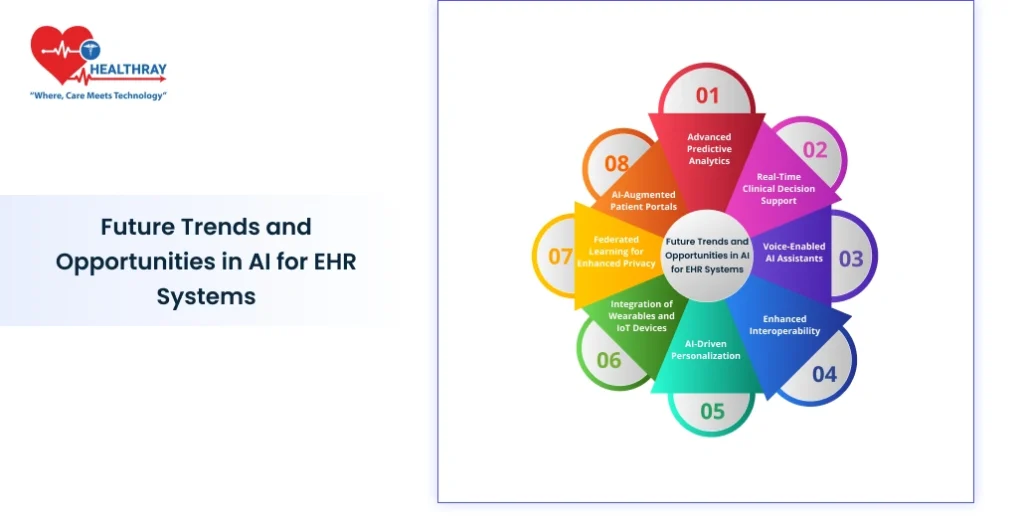
The future of AI in EHR systems is bright, with innovations poised to redefine how healthcare data is managed and utilized. Here’s a glimpse into the trends and opportunities that EHR companies can look forward to:
Advanced Predictive Analytics
AI is expected to move beyond identifying trends to predicting outcomes with remarkable accuracy. This will help healthcare providers intervene early in cases like chronic disease management or hospital readmissions.
Opportunity: EHR systems with predictive capabilities will become invaluable tools for preventive care, saving costs and improving patient outcomes.
Real-Time Clinical Decision Support
As AI algorithms evolve, they will provide real-time recommendations during patient consultations. This can range from suggesting treatment protocols to flagging potential drug interactions instantly.
Opportunity: EHR companies can position their platforms as indispensable tools for improving clinical efficiency and patient safety.
Voice-Enabled AI Assistants
Voice technology is on the rise, with AI assistants capable of transcribing medical notes, scheduling appointments, and retrieving patient data via simple voice commands.
Opportunity: Incorporating voice AI into EHR systems can streamline workflows and reduce administrative burdens on healthcare providers.
Enhanced Interoperability
AI will play a pivotal role in enabling seamless data exchange between EHR systems, hospitals, labs, and other healthcare entities. This will foster a more connected and efficient healthcare ecosystem.
Opportunity: Developing interoperable EHR platforms with AI-driven data-sharing capabilities can give companies a competitive edge.
AI-Driven Personalization
EHR systems will use AI to deliver highly personalized healthcare recommendations. This includes tailored treatment plans based on genetic profiles, lifestyle, and historical data.
Opportunity: Personalization can improve patient engagement and satisfaction, making AI-enhanced EHRs highly desirable.
Integration of Wearables and IoT Devices
AI will analyze data from wearable devices and IoT sensors to provide a holistic view of a patient’s health in real time.
Opportunity: EHR platforms that integrate with IoT and wearable tech will attract healthcare providers focused on proactive and patient-centered care.
Federated Learning for Enhanced Privacy
Federated learning is an emerging AI approach that trains algorithms across decentralized devices while keeping data localized. This method enhances privacy without compromising AI’s learning capabilities.
Opportunity: EHR companies can leverage federated learning to address privacy concerns while harnessing the power of AI.
AI-Augmented Patient Portals
Patient portals powered by AI will evolve to provide self-service tools like symptom checkers, appointment booking, and automated follow-ups.
Opportunity: User-friendly patient portals can boost patient engagement and satisfaction, adding value to EHR systems.
The opportunities for AI in EHR systems are vast. Companies that stay ahead of these trends and invest in innovative AI capabilities will not only enhance patient care but also solidify their position as leaders in the healthcare tech industry.
Conclusion
AI-powered insights are no longer a futuristic concept; they are the present and the future for EHR companies. From enhancing data analysis to streamlining operations and personalizing patient care, AI has the potential to revolutionize the way EHR systems operate.
However, successful implementation requires strategic planning, addressing challenges like data privacy and user adoption, and staying ahead of industry trends. CEOs, CTOs, and product managers who leverage these insights can drive innovation, improve healthcare outcomes, and gain a competitive edge in the market.As the healthcare industry continues to evolve, Hospital Management System companies have a unique opportunity to lead the charge by adopting AI. The question is no longer whether to invest in AI, but how to do it in a way that maximizes impact while navigating the complexities of the healthcare ecosystem.
